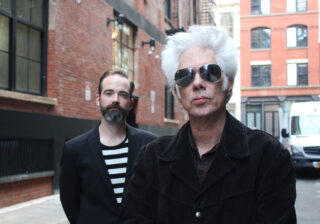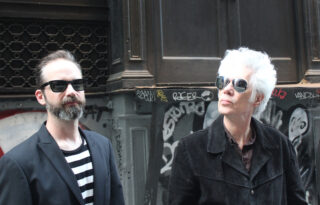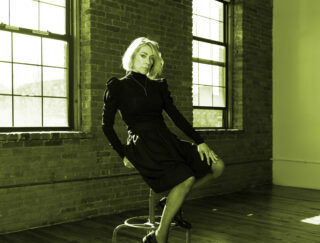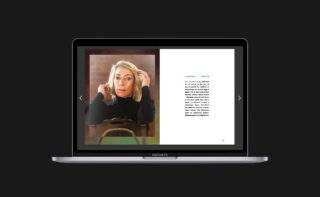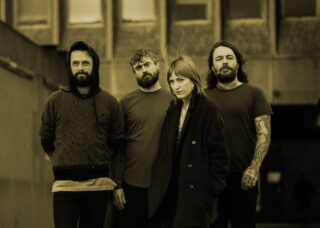IR: Let’s talk about your new album, Silver Haze. SQÜRL formed back in 2009 and have released various EPs and soundtracks since, but this will be your first full-length studio record. What’s taken you so long?
JJ: We don’t do anything by any explicit plan. In our world we do a lot of different projects, in both music and film, so it just seemed to fit with our timing. We had wanted to do a more studio-based recording with a producer involved, and then Carter had been guiding us towards Randall Dunn who we ended up just loving working with. It just seemed like the right time. We’ve done full-length soundtracks of course before but all the SQÜRL stuff has been EPs. Things just kind of happen, we try to plan, but the best plans are no plans.
IR: You called your producer Randall Dunn “the navigator of your musical boat”. That’s a nice way of putting it.
JJ: Well, he was a kind of navigator: he would oversee and guide us. We started by bringing him a lot of rough tracks that we had made. He had ideas right away. We were just seeing if he would be interested in this stuff but he was already making notes.
CL: At the same time he could have turned around and told us we weren’t ready. He wants to get involved at a point where he can see a direction and once I felt that we had one, he kept us on the course.
JJ: Like Stephen O’Malley and Marc Ribot who we got to come play on the record; we love Boris too.
IR: You both seem to thrive off collaboration.
CL: Yes, being in a band and making films, from our perspective, require collaboration and openness and value placed on everyone’s individual role in that process. There are people who do these things by themselves but that’s not been our way.
IR: Charlotte Gainsbourg and Anika are also on the record: how did that come about?
JJ: I don’t know why but I have had an aversion to male vocals in general. There are so many incredible female vocalists in all genres and so I am so drawn to them. We played at a Sacred Bones big anniversary concert with all these bands and we saw Anika play and we just fell in love with her approach to music. Charlotte is a friend and someone who I have always been taken by her effortless artistry as both an actress and a musician.
IR: Do you give specific directions before you work with artists like this, maybe like you would with a film, Jim, or is it looser when you’re making music?
JJ: Well, we were asking Charlotte to recite the poems and not sing them so that was pretty straightforward; she had the music to get under her skin. With Anika it was more interesting perhaps as we had a few different ideas and she would give back different options. Recently we’ve been thinking it would be great to just let her do her own thing on our music though and not give her any guidance at all – we love her approach.
IR: The spoken word is used very powerfully on Silver Haze and you’ve both said you are bored by auto-tune – why would you say that’s the case?
JJ: I don’t know, we just get tired of technology.
CL: As much as repetition is essential in all forms of music, the beautiful thing to us remains the variations in those repetitions so that nothing is exactly the same each time. We’re not going to copy and paste a chorus or even a loop necessarily; we are manipulating and affecting the loop throughout.
JJ: I love electronic music and its history, but I also love computer-generated music when it’s an experiment. A friend of ours does photography; he had a job some years ago running the video screens for U2’s live show and he told us that because it’s all sync’d up they play to a click track, never playing anything in a different way. I almost fell down – holy shit, that’s not rock and roll! We were appalled; we realise big bands do this kind of thing, but come on! It was deeply offensive, musically.
CL: The idea that The Edge, who can be an incredibly evocative guitarist, would play the same exact solo at the same time every single night is quite sad.
JJ: It’s pathetic!
CL: We prefer the Frank Zappa philosophy. That’s really the spirit that we approach music with. It’s not rigid, it can grow and mutate as a form. Trying to replicate it exactly the same, searching for the perfect take, auto-tuning for example, it is just not interesting to us.
JJ: When I first brought guitar tracks to Randall, he would say, “I like this guitar line, maybe we should re-record it.” And I would say, “Oh god, I have no idea what I was playing then.” So a few weeks after Randall had been working on it he told me there’s no need to re-record anything, they’re perfect as they are. He had incorporated the damaged aspects of them into the music, which was very telling as a kind of artistry – almost like a painter who appreciates texture and imperfection.
IR: I was going to ask you if any musical accidents made their way on the album but it sounds like they did…
JJ: Pretty much all of them. I don’t really practise playing guitar technically very much, I just plug it in and see what interesting stuff comes out. Almost everything I do has something accidental to it.
IR: You take direct inspiration from the New York School of Poets with the track ‘John Ashbery Takes a Walk’. Would you say the album shares the same spirit?
JJ: The New York School of Poets are my aesthetic godfathers. I studied with the great poet Kenneth Cooke, I studied with David Shapiro, I am close friends with Ron Padgett, I got to know John Ashbery a little bit, and of course Frank O’Hara is very important. All of these poets are very important to me as guides to everything I create. In the late ’50s Frank O’Hara wrote a little manifesto called ‘Personism’, and in it he says that when you create anything you should be directing it to one other person. If you’re directing it to the whole world it’s just too broad and egotistical in a way.
I’m paraphrasing but the idea is you make something and say it to one person. That’s always been extremely important to me, as well as the idea of making sure you are celebrating the creators that came before you and embracing them and embodying them. And never take yourself too seriously – the New York School always has humour in the poems, and experimentation.
CL: I didn’t have the benefit of having studied with those incredible poets, but that perspective has pervaded a lot of things I have made over the years. Particularly films or albums, I just make them for my friends – they’re the only people who really matter if they like it. Trying to have a sense of humour and humility is also something I have learnt from those poets; those are essential life tools I think, certainly as surviving as an artist. If you’re trying to appeal beyond what you know you have lost your whole footing.
JJ: Then you become Bono… No, I’m only kidding – enough U2 jokes.
IR: You might need a sense of humour for my next question. Rolling Stone said you guys had “the best satirical use of an umlaut by a serious band”. That’s quite an honour – was there stiff competition?
CL: They did give out quite a number of umlaut awards in that issue. We are not alone. I do appreciate that they understood where we are coming from with it. To be honest, most of the references that we’ve been inspired by that use an umlaut have a tongue-in-cheek element to them. Motörhead, Blue Öyster Cult or Mötley Crüe weren’t overly serious about their spelling.
IR: That’s true. You’re so unpredictable as a band – so what’s next for SQÜRL?
CL: In terms of live dates we’re going to have a record release show, but other than that we have a show in New Orleans at the Overlook film festival, which is a destination for horror fans worldwide. We’re going to be playing there as a tenth anniversary celebration of Only Lovers Left Alive, and we hope to do more surrounding that film. It’s something that’s really special to us having made both the film and the music. It resonates with a lot of people and has continued to grow.
JJ: I think you can tell by now we certainly don’t plan things – you can hear it in the record. There’s a track called ‘End of the World’; we had the instrumental track and whilst we were in the studio just mixing it and playing around with it I was sitting there writing this text, it just came to me out of the music, I just sort of drifted away and wrote it. We never set out to do it that way; I’ve sketched out lyrics before while listening back but this was different, even the subject arrived without thinking about it.
IR: Does music allow you that spontaneity, compared to a more rigid medium like film?
JJ: There’s a little less pressure. In film everyone is waiting to know what we’re doing next and how are we doing it, but of course you do different takes and try different things, it does have similar elements to making a record in a studio. My role is very different though – directing a film you become the navigator of the whole ship, and with music it’s more like collaborating with your other sailors, it takes pressure off for me. I love throwing things at Carter and Randall.
CL: Oh yeah, I remember those lyrics [to ‘End of the World’] just fit. Because he was working in response to the music they just fit. It echoes the siren sound in the song, which is the Moog. I don’t think I heard the entire text until we started recording it though. He said, “I have this thing, I think it will work,” so we said, “Okay, let’s set up the mic.” A couple of takes later, it was done.
IR: I wonder if that’s how Bono does it.
CL: Who knows.
JJ: No comment.
Photography by Sara Driver




